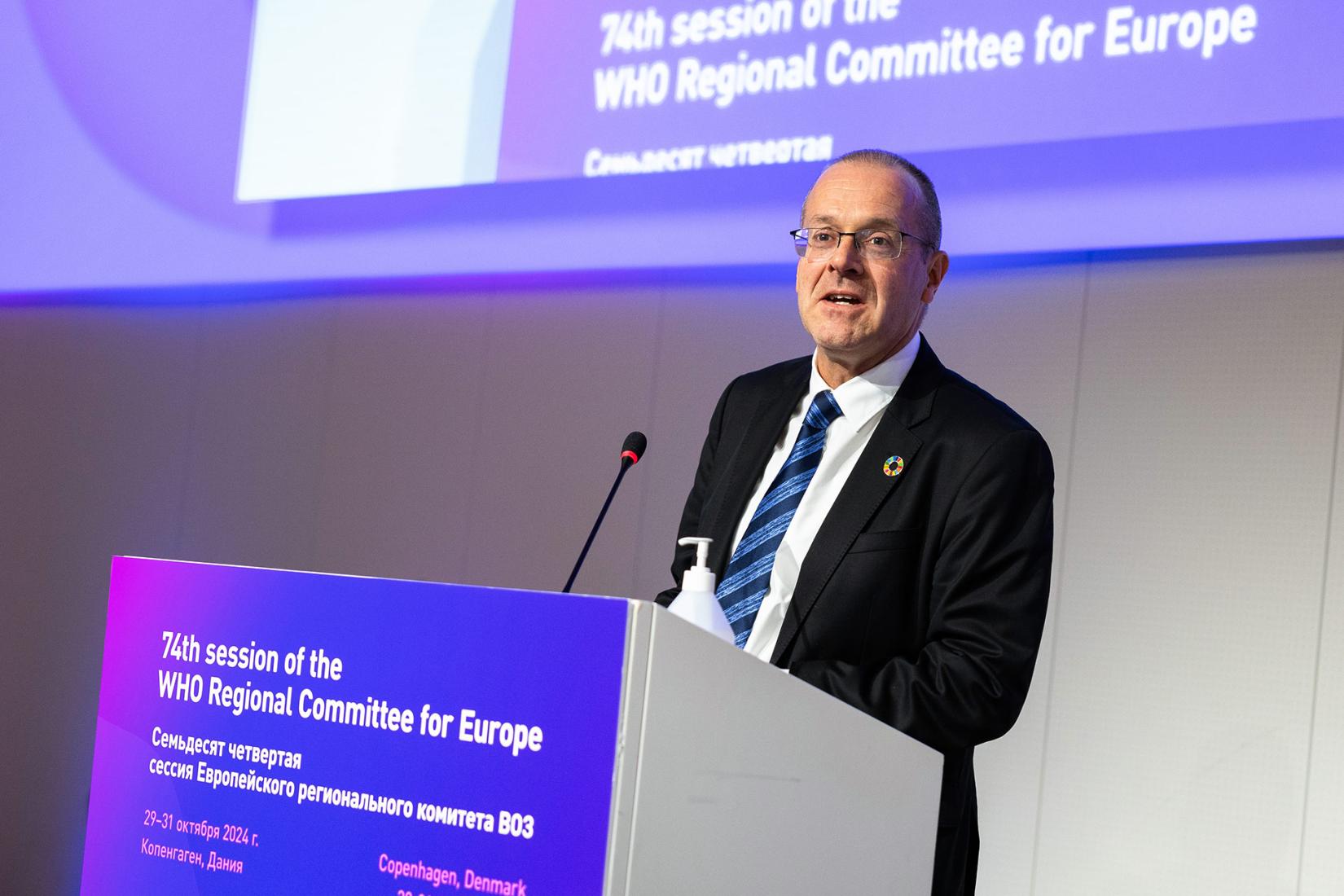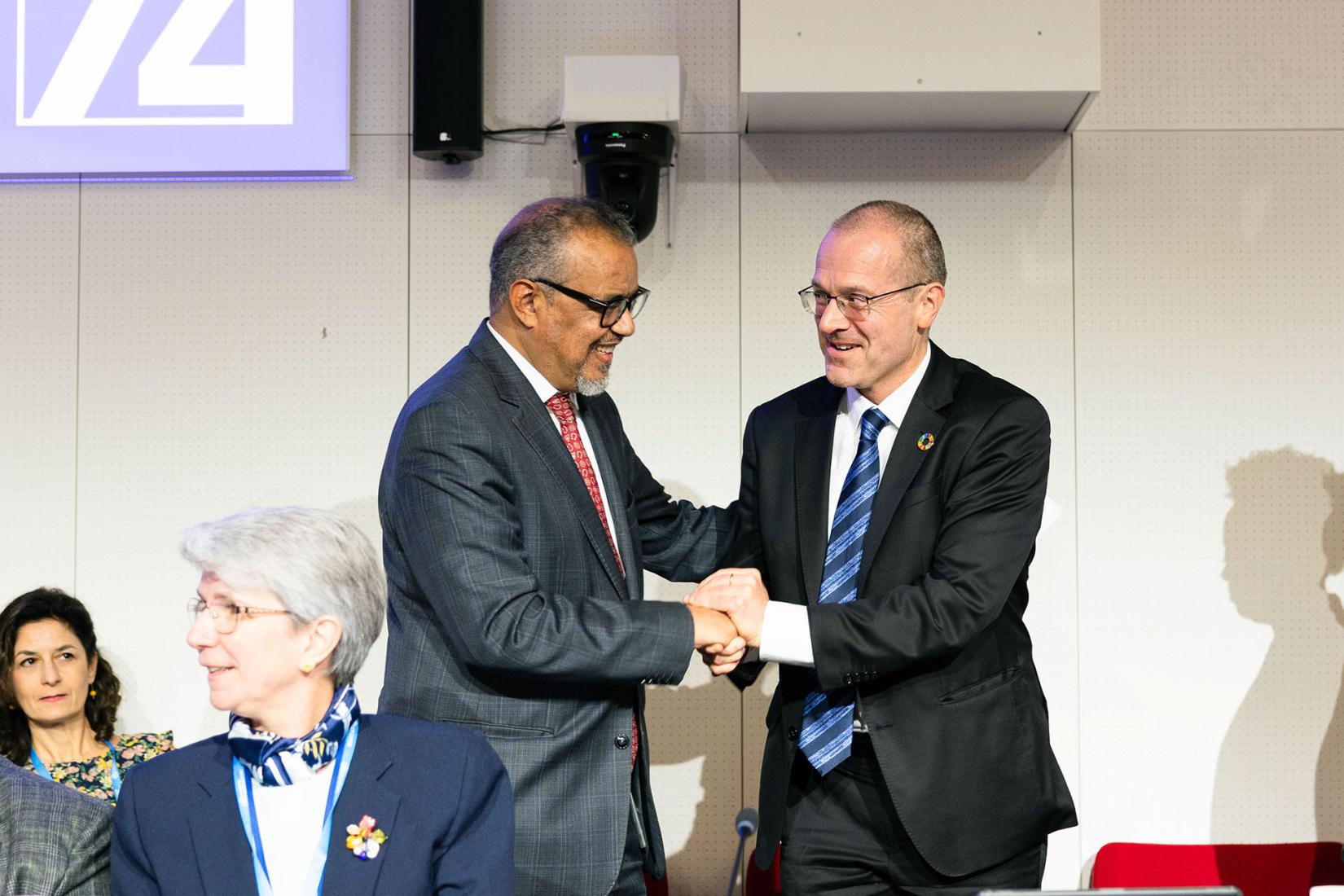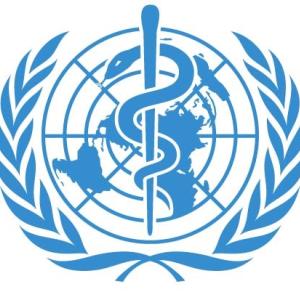Dr Hans Henri P. Kluge nominated by Member States to serve as WHO Regional Director for Europe for a second 5-year term
31 oktýabr 2024
Public health priorities for the coming half-decade will focus on critical areas including national health security, mental health, the climate crisis and gender-based violence
Copenhagen, 30 October 2024

The Member States of the WHO European Region have nominated Dr Hans Henri P. Kluge to the office of WHO Regional Director for Europe for a second 5-year term, which will begin in February 2025 after his formal election by the WHO Executive Board.
Addressing delegates at the 74th session of the WHO Regional Committee for Europe, meeting in Copenhagen (RC74), Dr Kluge expressed his gratitude.
“Serving as WHO Regional Director for Europe has been the honour of my life, and I am truly so thankful – and humbled – by the overwhelming support demonstrated for my nomination. Looking ahead to my second term next year, my first task will be to consult all 53 Member States across Europe and central Asia, as well as all our health partners, to develop our next 5-year plan together, also known as the European Programme of Work’s second edition,” said Dr Kluge.
“We will continue to build on the many successes of the past 5 years, including our work on pandemic preparedness and health system strengthening, mental health, digital health, and immunization. But we will also expand our priorities to include critical areas like strengthening national health security, tackling the health impacts of the climate crisis, taking urgent action on antimicrobial resistance and promoting healthy ageing amid rapidly shifting demographics. All of this will be complemented by a renewed focus on women, girls and youth, including by addressing the damaging pushback on sexual and reproductive health and rights, and a concerning rise in gender-based violence.”
Member States at RC74 have also been discussing how to work with WHO/Europe and within their own countries to tackle 4 pressing issues:
- adopting a framework for resilient and sustainable health systems, underpinned by strong levels of trust, a renewed commitment to primary health care and increased investment in the health workforce;
- strengthening health emergency preparedness, response and resilience in the European Region – also known as Preparedness 2.0;
- enhancing emergency medical teams capacity up to 2030, to ensure rapid deployments to acute health emergencies wherever they occur; and
- developing a strategy for harnessing health innovations and emerging technologies in the Region, which will be presented for endorsement in 2025.
Resilient and sustainable health systems
Member States acknowledge the need to continue to invest in and strengthen their health systems, learning lessons from the COVID-19 pandemic. Ultimately, improving the health and well-being of citizens will rest on a number of critical actions, such as bolstering the role of primary health care and family doctors; investing in the health workforce of tomorrow through proper training, recruitment and retention; harnessing digital solutions and artificial intelligence in health care; and developing sustainable financing models that ensure health systems have the necessary funds to deliver quality care.
“It’s time to shift our mind sets and view health once and for all as an essential investment and not just a cost to the taxpayer,” continued Dr Kluge. “Evidence across our Region and globally shows that investments in the health sector are not a drain on the economy – quite the opposite. In fact, the health sector provides multiple benefits beyond individual and community health and well-being. It promotes economic growth and job creation, contributes to social cohesion, and improves workforce efficiency, to name just 3.”
Preparedness 2.0
Preparedness 2.0 is WHO/Europe’s new regional strategy and action plan for health emergency preparedness, response and resilience for the coming 5 years (2024–2029). Designed to elevate efforts in the Region to prepare for, prevent, respond to and become more resilient to health emergencies, this forward-thinking plan takes preparedness to the next level as it builds on the lessons learned from recent crises.
“We have an opportunity to absorb and implement the lessons of COVID-19 and other health emergencies, and apply them in a strategic, ambitious yet practical way to ensure we are better prepared for whatever may happen,” said Dr Kluge. “Adopting a dual track approach is key, whereby health systems are designed to deliver essential health services while at the same time being ready to scale up and respond to health emergencies at short notice. Preparedness 2.0 also complements ongoing efforts by WHO Member States to reach a global Pandemic Accord, along with recent amendments to the International Health Regulations.”
Emergency medical teams
The Emergency Medical Teams (EMT) Regional Action Plan 2024–2030 paves the way for countries of the European Region to establish and strengthen their own EMT capacities. By supporting national efforts, this plan ensures high-quality, life-saving medical services are closer to those who need them in times of crisis. The European Region is already home to one of the world’s strongest EMT networks, comprising over 85 teams with more than 75 000 highly trained medical professionals, providing a solid foundation for implementing the Regional Action Plan.
“From natural disasters to conflicts to disease outbreaks, the goal is better preparedness and faster response, ensuring everyone, everywhere, receives the care they need when it matters most. We’ve seen how critical EMTs have been to our health response to the war in Ukraine, the devastating earthquakes in Türkiye and climate-related emergencies. Together, we’re making sure that every country in our Region can stand strong, equipped, and ready to respond with EMT support to a range of health challenges,” said Dr Kluge.
Harnessing health innovations and emerging technologies
In the face of multiple crises, the unfinished agenda of noncommunicable diseases and mental health, an ageing population and shortages of health workers, business as usual is simply not an option for European Region health systems. The health sector must adopt innovation as a core process in promoting health. The Region has many innovation hubs in health, but they can often operate in silos and fail to exchange knowledge and ideas with other sectors, including public health. New solutions emerge daily, often too fast for governments to evaluate, adapt and adopt. That is why Member States are working together to develop a strategy to harness health innovations and emerging technologies, with a view to endorsing the strategy at next year’s Regional Committee meeting.
“We have limitless opportunities to exploit technological, social and financial innovations in the European Region,” noted Dr Kluge. “These new technologies can revolutionize patient experiences, help manage chronic conditions, promote good health and well-being, and support our health and care workers. But despite their promise, we are yet to unleash their full potential. Countries still struggle to finance, implement and form partnerships with start-ups and innovation hubs, and share the benefits on innovation ethically and equitably. Together, by building on the solid examples of innovations we’ve already established in digital health and novel medicines in recent years, we hope to change that.”
Permacrisis the new normal
Dr Kluge began his first term as Regional Director just as the COVID-19 pandemic was taking hold, devastating lives and livelihoods everywhere, placing unprecedented pressures on health systems. As COVID-19 began to come under control, another health emergency, mpox, initially emerged in the European Region before becoming a global concern. Added to that were extreme weather events including heatwaves and floods, the earthquakes in Türkiye and Northwest Syria, as well as acute, long-running humanitarian crises in Ukraine, and Gaza, Israel and Lebanon. In short, the past 5 years have been marked by a permanent state of crisis – or permacrisis – challenging health systems and health workers on multiple fronts.

“By identifying and acting on priorities of importance to the almost 1 billion people across Europe and central Asia, our Member States display welcome solidarity and multilateralism at a time of deepening distrust and division,” concluded Dr Kluge. “Health can and does bring countries and communities together. We at WHO/Europe are grateful for the opportunity to work with our Member States and partners to help shape the future of health for the benefit of all.”



